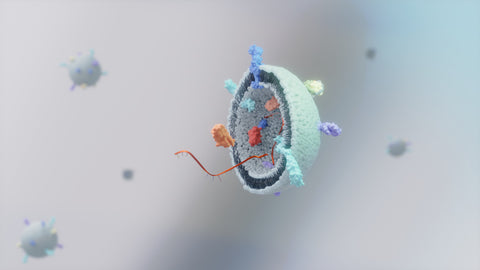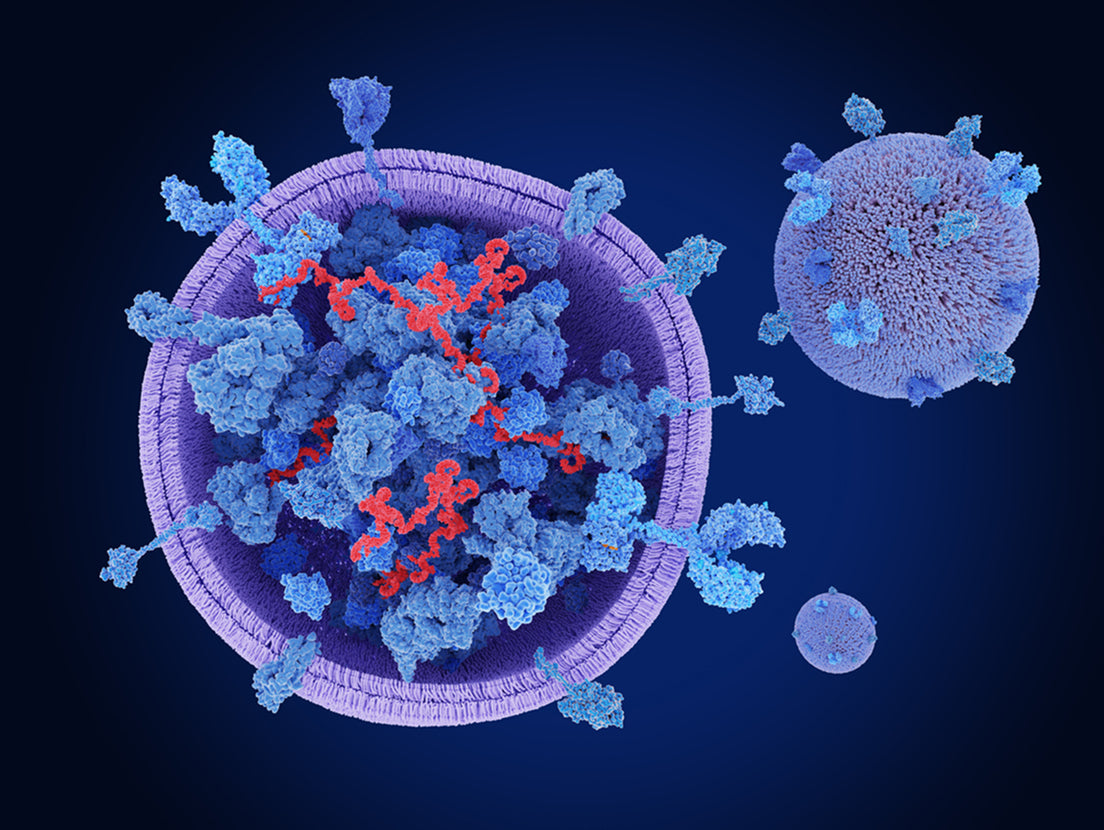**Updated June 2025**
Exosomes are gaining a lot of buzz in the skincare world as the next big thing, but they're also raising a lot of questions: what are exosomes? what can exosomes do for my skin? Are they safe to use?
Here we'll answer all those questions and more to help you decide if exosomes might be a good fit to improve your skin.
What are exosomes?

Exosomes are microscopic extracellular vesicles: tiny sacs containing proteins, lipids, amino acids, and nucleic acids, wrapped in a lipid membrane.
They are secreted by cells all over your body and can be found in bodily fluids like blood, saliva, and cerebrospinal fluid. The type of material contained in the exosome depends on the type of cell it came from, but typically contains DNA & RNA from the source cell along with other cell components.
In skincare products, they are derived from various cells in the body, including stem cells, and have all DNA and RNA removed before being added to the product.
What do exosomes do?
Within the body, exosomes serve a very important function as a sort of inter-cellular delivery service. They are essentially packages of genetic materials and cell building blocks that allow cells to communicate and share resources. As a result, exosomes arriving from healthy to damaged cells can trigger positive processes like healing or reactivating dormant cells.
Exosomes derived from unhealthy cells can also initiate unhealthy processes like increasing inflammation, so it's important that exosomes for treatments come from healthy cells.
[Read more about the basics on Exosomes at Wikipedia,or a more in-depth, scientific perspective here.]
How do exosomes improve your skin?
As a new technology in skin care, researchers are still looking into more ways that exosomes can improve skin, but so far they have shown impressive results with exosomes reducing inflammation and speeding up healing processes.
Many dermatologists now offer exosome therapies as a follow up to in office procedures like microneedling or laser treatments to shorten healing time and maximize results. Because exosomes typically have such a short shelf life, they have mostly been available in clinics, but are becoming increasingly available in at-home products as shelf-stability research progresses.
Exosome products that have been developed for skin care at home boast impressive clinical results in reducing redness, calming inflammation, and improving overall skin health and texture while reducing the signs of aging.
[For more information, you can read these articles from Elle and Allure]
AnteAGE MD Exosome Products

The best-selling AnteAGE MD System was recently updated, adding exosomes to the formula, so if you're already a fan of AnteAGE, and interested in trying out exosomes, this is the perfect place to start.
AnteAGE has developed their own proprietary form of exosomes, called Biosomes™. Biosomes™ are a unique development, with a hybrid of two different kinds of exosomes blended together.
With exosomes derived from adult Bone Marrow stem cell and from Umbilical Cord stem cells, you get the combined benefits of anti-inflammation from the mature exosomes, and improved cellular regeneration from the young cells.
To read more about AnteAGE's exosome process, read more here.
(plated) Skin Science Exosome Products

One of our newest brands, (plated)™ Skin Science uses a patented platelet derived exosome called Renewosome™, to deliver stunning results. With over 1 trillion exosomes in each bottle, (plated)™ serums are clinically proven to reduce the signs of aging and enhance the skin's overall appearance and texture.
If you're new to exosome treatments it is recommended to start with the INTENSE Serum, which contains a higher concentration of exosomes. Use 1-2 bottles of INTENSE (or more, depending on your desired results), then transition to the DAILY Serum for a maintenance concentration.
(plated)™ also makes an Eye serum HAIR serum which can help your hair appear thicker and fuller by hydrating and delivering nutrients to the scalp, reducing shedding and breakage, and may even encourage new hair growth in some people.
Where do the platelets in (plated)™ products come from?
(plated)™ purchases their platelets from compliant blood banks, then further processes them to isolate the exosomes and remove genetic material like DNA. This proprietary manufacturing process ensures a safe formulation with high levels of purity and consistency from batch to batch.
Additionally, they work ethically, only purchasing platelets that can no longer be used for medical purposes, but that have enough shelf life left to be processed and extract the exosomes.

Are exosomes safe to use? How do they relate to stem cells? Do they contain DNA?
People are understandably cautious with new technologies, and some may be concerned about exosomes, especially those derived from stem cells.
Stem cells have been studied for use in medical therapies for years, but are rarely used clinically. Despite their demonstrated ability to encourage healing and regeneration, they present too many problems to be widely used. Their large size can cause bad reactions in the body like toxicity, and their ability to replicate, can encourage malignant cell growth.
However, stem cell-derived products like growth factors, and some types of exosomes, are able to provide the benefits of stem cells while minimizing risk.
Because exosomes and stem-cell derived ingredients are much smaller than stem cells, they are easier to sterilize and can be more easily administered in medical therapies. Additional processing removes any genetic material, if present.
Exosomes also lack the ability to self-replicate like stem cells, so abnormal growths like tumors are not a concern.
Skincare products containing stem cell-derived growth factors and similar ingredients have been safely used by hundreds of thousands of people for over 20 years.
Though there has been no anecdotal evidence of adverse effect associated with these products, some doctors do not recommend using them if you have a history of skin cancer or are currently undergoing cancer treatment. Consult your Dermatologist or Oncologist before using products containing stem cell-derived ingredients if you have these concerns.
SkinMedica TNS Advanced Serum and NEOCUTIS Bio Serum Firm are two best selling examples that bring the rejuvenative effects stem cells offer without the risks attached.
Because exosomes, including those derived from stem cells, come with the same minimized risks as stem-cell derived ingredients, they are similarly safe to use.
[Read more about the differences between stem cells and stem-cell derived exosomes here.]
Exosomes are a tricky to understand, but hopefully this article helped you get a better idea of how they can help your skin and feel a bit more comfortable with the idea of adding them to your skin care regimen. Comment to let us know if you have additional questions we didn't address here.





